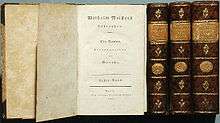Wilhelm Meister's Apprenticeship
Wilhelm Meister's Apprenticeship (German: Wilhelm Meisters Lehrjahre) is the second novel by Johann Wolfgang von Goethe, published in 1795–96.
 Title page of first edition | |
| Author | Johann Wolfgang von Goethe |
|---|---|
| Original title | Wilhelm Meisters Lehrjahre |
| Language | German |
| Genre | Philosophical novel |
| Publisher | Johann Friedrich Unger (Berlin) |
Publication date | 1795–1796 |
| Preceded by | Wilhelm Meister's Theatrical Calling (Wilhelm Meisters theatralische Sendung) (1777–1785) |
| Followed by | Wilhelm Meister's Journeyman Years (Wilhelm Meisters Wanderjahre) (1821–1829) |
Plot
The eponymous hero undergoes a journey of self-realization. The story centers upon Wilhelm's attempt to escape what he views as the empty life of a bourgeois businessman. After a failed romance with the theater, Wilhelm commits himself to the mysterious Tower Society.
First Book
Wilhelm Meister's Apprenticeship depicts the eighteenth-century German reception of William Shakespeare's dramas: the protagonist is introduced to these by the character Jarno, and extensive discussion of Shakespeare's work occurs within the novel's dialogues. Wilhelm and his theater group give a production of Hamlet, in which Wilhelm plays the lead role. Shakespeare's work had begun to be translated into German in the 1740s, and had attained tremendous popularity and influence in Germany by the end of the century.
Origins
Goethe's work on the novel began in the 1770s. An early version of the work, unpublished during Goethe's lifetime, was discovered in the early twentieth century, and published under the title Wilhelm Meister's Theatrical Calling (Wilhelm Meisters theatralische Sendung). When the Apprenticeship was completed in the mid-1790s, it was to a great extent through the encouragement and criticism of Goethe's close friend and collaborator Friedrich Schiller that it took its final shape. Wilhelm Meisters Wanderjahre ("Wilhelm Meister's Journeyman Years"), the sequel to the Apprenticeship, was already planned in the 1790s, but did not appear in its first edition until 1821, and in its final form until 1829.
Genre
Further books patterned after this novel have been called Bildungsroman ("novels of formation"), despite the fact that Wilhelm's "Bildung" ("education", or "formation of character") is ironized by the narrator at many points.[1]
According to Andrew Crumey, "while Wilhelm Meister’s Apprenticeship is billed as the classic coming-of-age tale, or Bildungsroman, it’s really far more than that: a story of education and disillusionment, a novel of ideas ranging across literature, philosophy and politics, a masterpiece that resists all pigeonholing."[2]
Legacy
The novel has had a significant impact on European literature. Romantic critic and theorist Friedrich Schlegel judged it to be of comparable importance for its age to the French Revolution and the philosophy of Johann Gottlieb Fichte.
Arthur Schopenhauer cited Wilhelm Meister's Apprenticeship as one of the four greatest novels ever written.[3]
Schopenhauer also mentions the book in his Aphorismen zur Lebensweisheit.
Arguing against chasing transient pleasures, Schopenhauer says, "Where we were looking for pleasure, happiness and joy, we often find instruction, insight and knowledge, a lasting and real benefit in place of a fleeting one. This idea runs like a bass-note through Goethe's Wilhelm Meister; for this is an intellectual novel and is of a higher order than the rest."[4]
Wilhelm Meister's Apprenticeship provided the text for many lieder, among others by Beethoven, for example Sehnsucht: Gedicht von Goethe viermal in Musik gesetzt von L. van Beethoven, four settings of "Nur wer die Sehnsucht kennt", WoO. 134 (1808), and by Schubert, for example D 877, Gesänge aus Wilhelm Meister, Op. 62 (1826).[5] Schubert set several excerpts more than once:[6]
- "Was hör' ich draußen vor dem Tür" from Book 2, Ch. XI: D 149
- "Wer nie sein Brot mit Tränen aß" from Book 2, Ch. XIII: D 478 No. 2
- "Wer sich der Einsamkeit ergibt" from Book 2, Ch. XIII: D 325 and 478 No. 1
- "Kennst du das Land" from Book 3, Ch. I: D 321
- "Nur wer die Sehnsucht kennt" from Book 4, Ch. XI: D 310, 359, 481, 656 and 877 Nos. 1 & 4
- "An die Türen will ich schleichen" from Book 5, Ch. XIV: D. 478 No. 3
- "Heiß mich nicht reden" from Book 5, Ch. XVI: D 726 and 877 No. 2
- "So laßt mich scheinen, bis ich werde" from Book 8, Ch. II: D 469, 727 and 877 No. 3
The 1866 opera Mignon by Ambroise Thomas is based on Wilhelm Meister's Apprenticeship.
The film The Wrong Move by Wim Wenders is a free adaptation of Wilhelm Meister's Apprenticeship.
Minjona, women's choir based at the University of Latvia is dedicated to Wilhelm Meister's Apprenticeship; in 2015, the ninth best female choir in the world.[7]
References
- See Sammons, Jeffrey L. (1981). "The Mystery of the Missing Bildungsroman; or, What Happened to Wilhelm Meister's Legacy?". Genre. 14: 229–246.
- "Book of a Lifetime: Wilhelm Meister's apprenticeship, JW Von Goethe". The Independent. 11 April 2008. Retrieved 24 April 2019.
- Schopenhauer, Arthur. "The Art of Literature". The Essays of Arthur Schopenhauer. Retrieved March 22, 2015.
- Search. Gutenberg.org. Retrieved 24 April 2019.
- "Nur wer die Sehnsucht kennt" at LiederNet Archive
- (in German) Otto Erich Deutsch, with revisions by Werner Aderhold and others. Franz Schubert, thematisches Verzeichnis seiner Werke in chronologischer Folge (New Schubert Edition, Series VIII: Supplement, Volume 4). Kassel: Bärenreiter, 1978. ISMN 979-0-0063-0514-8 — ISBN 9783761805718, p. 553
- INTERKULTUR World Rankings as of April 2015. Archived 2015-05-12 at the Wayback Machine
External links
- Online text of Wilhelm Meister's Apprenticeship at Bartleby.com
- Online text of Wilhelm Meister's Apprenticeship Archive.org 1855 English edition Boylan translation
- Online text of Wilhelm Meister's Apprenticeship Archive.org translated by Thomas Carlyle Vol 1–3 1824 edition published 1907
- Eiserhardt, Ewald (1920). . Encyclopedia Americana.
.jpg)